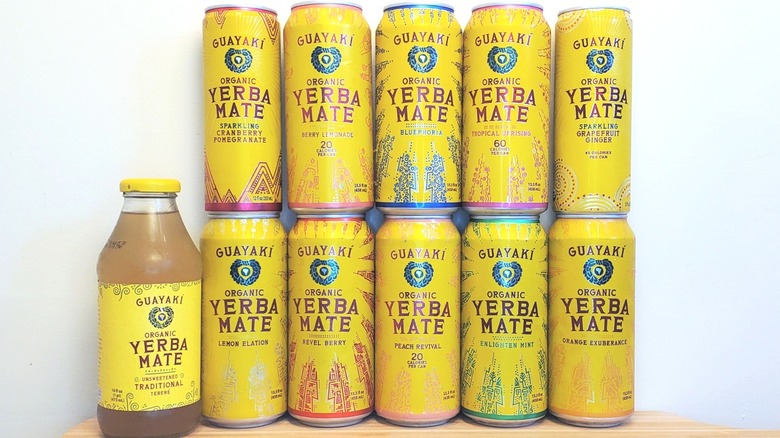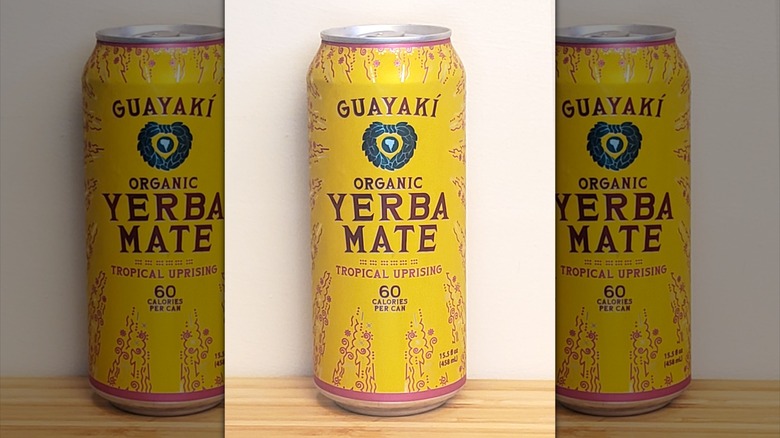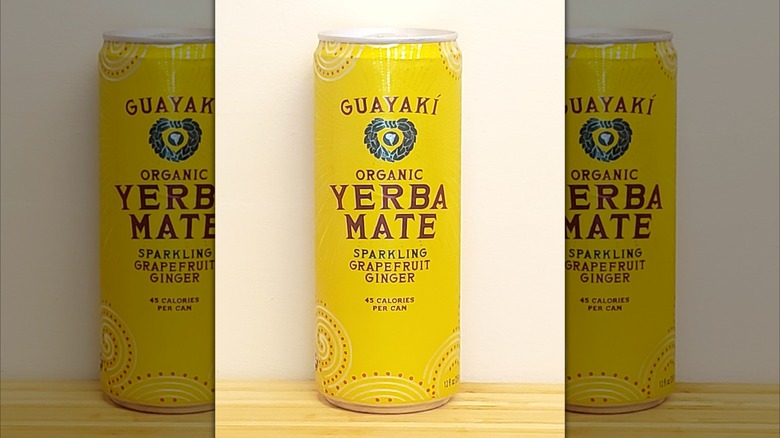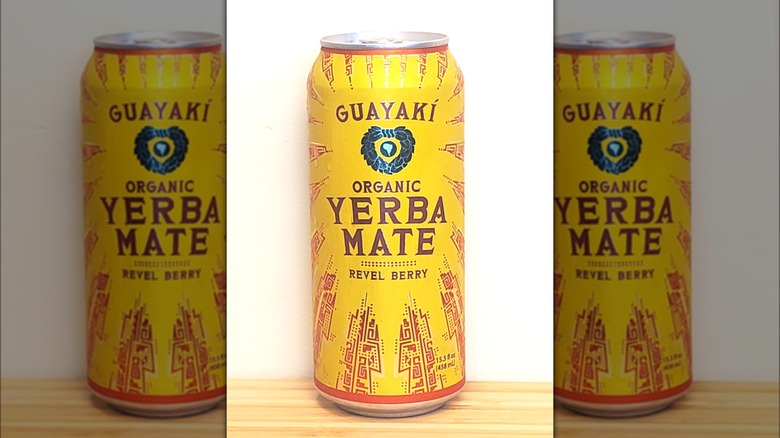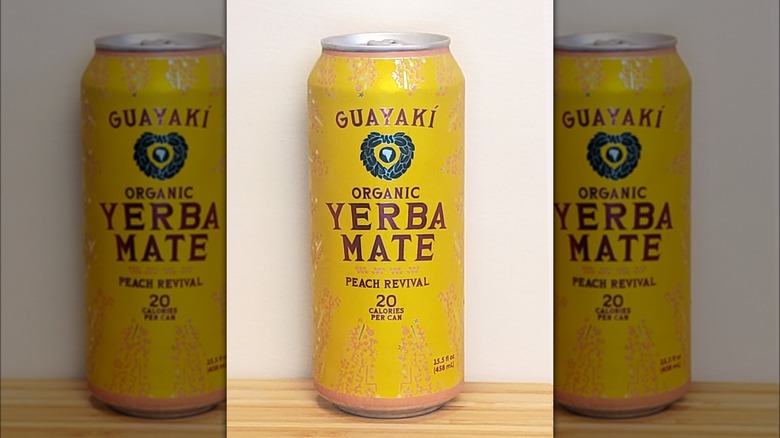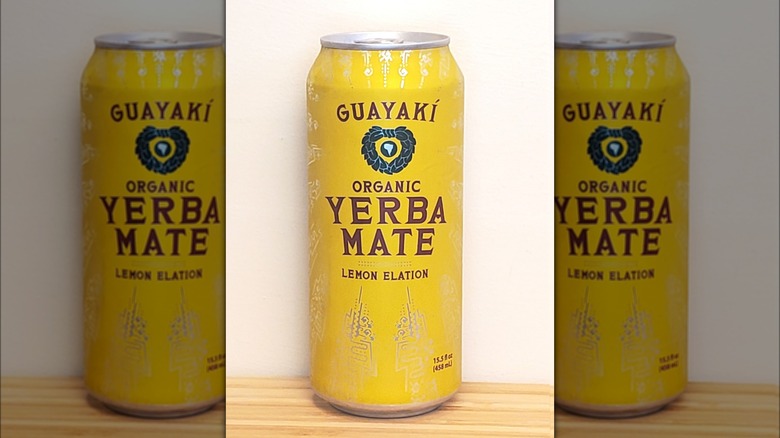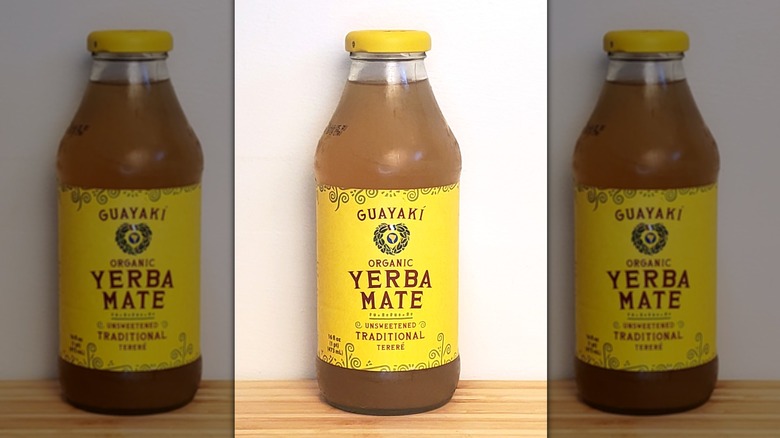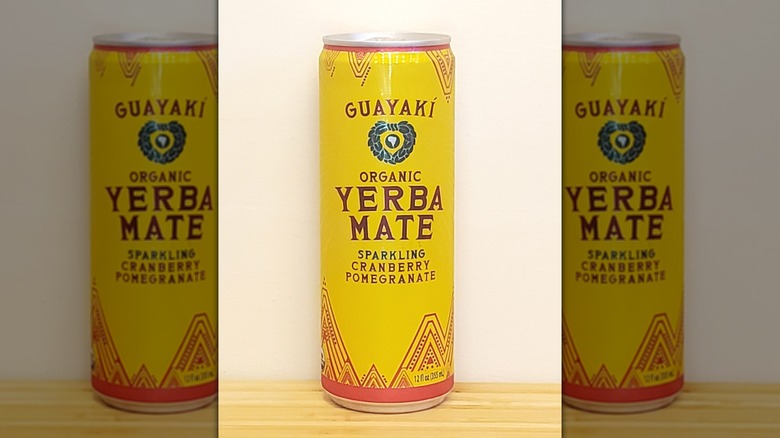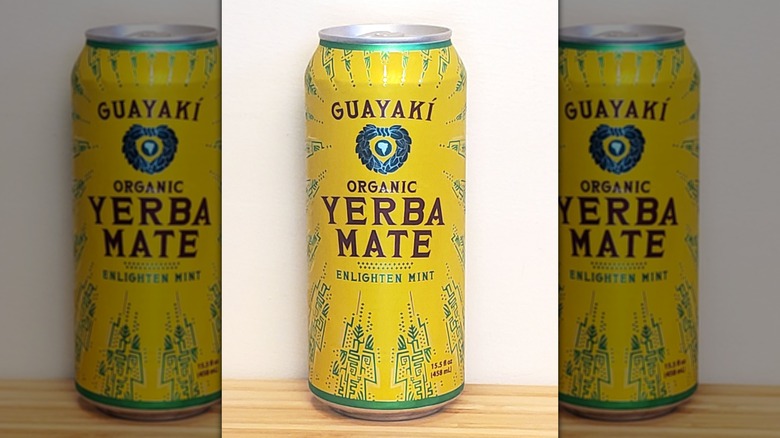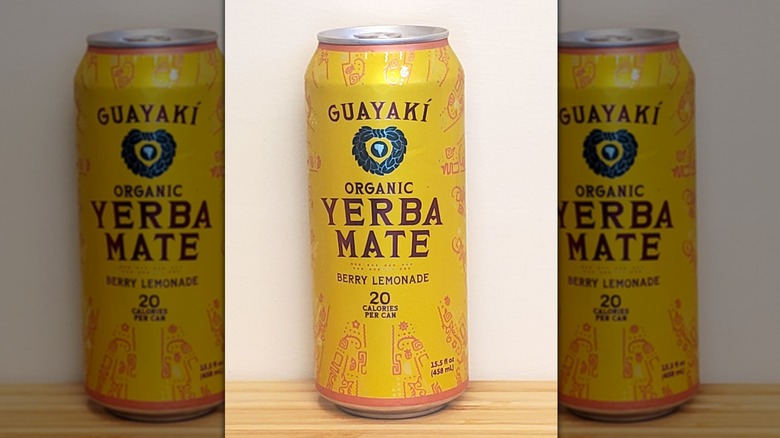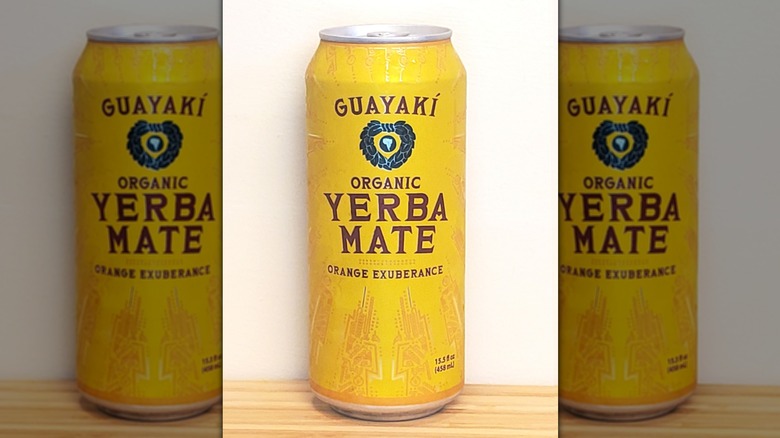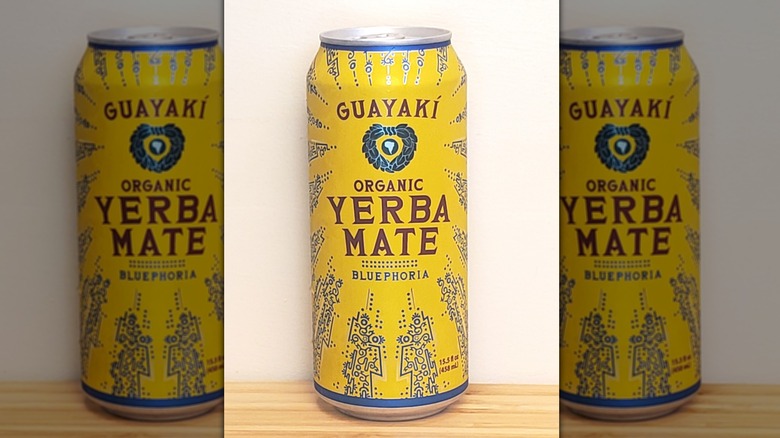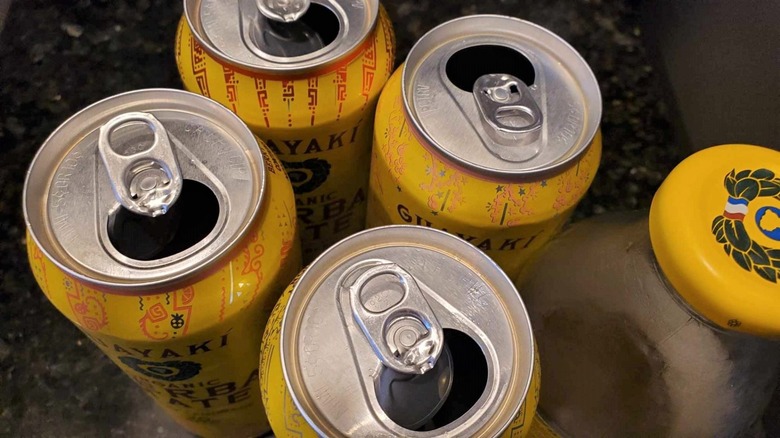11 Guayakí Yerba Mate Flavors, Ranked Worst To Best
Guayakí is a company that specializes in herbal teas made from the South American yerba mate tree, which creates a brew that somewhat resembles green tea. The Guarani people have their own long-held drinking ritual for yerba mate, but you can snag these teas off the shelf at your local grocery store, as I did for this taste test.
Guayakí grows yerba mate in Argentina, Brazil, and Paraguay and partners with indigenous peoples and local communities in this process. The plant is cultivated in local forests or areas aligned with the region's ecosystem. Its leaves are air-dried, avoiding conventional processes that can contaminate them. You can feel good about purchasing these yerba mate teas since each one is certified USDA organic and non-GMO verified. Additionally, Guayakí is a certified B Corp for its efforts in sustainability and inclusivity.
Yerba mate may have several health benefits, but it's best known for giving you a boost of energy, and that's how Guayakí positions its line of teas. Yerba mate contains magnesium, vitamin C, and zinc, and it may support weight management, improve mental health, and protect against a variety of diseases thanks to its antioxidant content. However, these teas also have elevated levels of caffeine, so they're not for children, nursing moms, or people with conditions like hypertension. All that said, I taste-tested 11 varieties of Guayakí yerba mate tea and ranked them according to taste, impact, and nutritional values. You can read more about how I determined my ranking at the end of the article.
11. Tropical Uprising
When thinking of tropical flavors, pineapple and coconut often come to mind. For this tea, Guayakí took a different route, combining pineapple with mango and guava, as well as apricot and hibiscus. This medley blended well together with the yerba mate and was a good match in terms of ingredient choices.
However, with the word "Uprising" in the name, I was expecting a flavor explosion in my mouth which did not occur. The pineapple flavor was barely discernable, and the other flavors were, for the most part, muted as well. Perhaps this is because Tropical Uprising only contains 1% juice. That said, the fruits blended well and gave a distinctive taste to this tea.
Oddly, this tea contained both 11 grams of added sugar and organic stevia leaf extract, which did not leave an aftertaste in this flavor. Because of its disappointing delivery on the name's promise and the mild flavor, Tropical Uprising ranked last in the lineup.
10. Sparkling Grapefruit Ginger
Next on the list is one of Guayakí's sparkling varieties. Grapefruit and ginger are a compelling flavor combination and well-suited for the flavor of yerba mate tea. What was interesting about both of Guayakí's sparkling options was that the initial flavor was bitter and somewhat overwhelming, kind of a "blow to the mouth" experience. However, once the tea was left out for a while, the taste settled down and was more pleasant.
Even if you are not a fan of ginger or grapefruit, this flavor can be pretty good, even with less than 1% juice content. Sparkling Grapefruit Ginger may not have a fun name, but it only contains 45 calories and 80 milligrams of caffeine.
This particular blend does not contain cane sugar. Instead, agave syrup is the main sweetener, along with organic stevia leaf extract. Happily, there was no unpleasant aftertaste, as can happen with stevia, and this tea only packs 10 grams of added sugar. This is a nice choice for a smaller caffeinated hit, but it's initially too bitter to rank any higher, officially landing it in spot number 10.
9. Revel Berry
Revel Berry contains an atypical berry choice, yumberry, as its flavor base. This fruit normally hails from China, so it is a surprising ingredient to find in Guayakí products. Also known as bayberries, these fruits are rich in vitamins and antioxidants.
For this blend, the yerba mate is brewed together with hibiscus tea. Revel Berry also claims to have hints of raspberry and blackberry, which are natural flavors added to the base ingredients. As a fan of berry flavors, my expectations were high for this test, but Revel Berry's muted flavor fell flat on delivery. In fact, the biggest highlight in this can was the flavor of yerba mate tea, believe it or not.
Overall, the taste just wasn't strong enough, especially with a whopping 27 grams of added sugar. With only 1% juice content, it's understandable that the flavor didn't resonate more. For 120 calories, there are lower-sugar ways to get your 150 milligrams of caffeine, so this tea placed at No. 9.
8. Peach Revival
Peach and iced tea are a timeless combination with a rich, unique flavor, so much so that some people like to make their own peach-flavored iced tea. Guayakí's peach juice-infused version of yerba mate tea has just a touch of lemon, as well as 150 milligrams of caffeine, for a great start to your day.
But this is not like sweetened Southern peach tea. Guayakí's version only contains 3 grams of sugar since it is primarily sweetened with organic stevia leaf extract. Although the peach flavor is very bold, this was the only Guayakí tea in my taste test where the stevia aftertaste was apparent.
Peach Revival contains natural peach flavor and one of the highest levels of sodium of these drinks, at 15 milligrams. It's not a lot, but it might be partly responsible for the lack of sweetness in this drink. If you like your peach flavor strong with earthy tones and free of sugar, this drink might be just right for you. Since unsweetened peach is not everyone's cup of tea, this earned the No. 8 spot.
7. Lemon Elation
Some think that the best iced tea is served with lemon, and if you agree, Guayakí's Lemon Elation fits the bill. The tea landed with an explosion of lemon flavor on the tongue, but that was only the start of your flavor journey.
This tea also contains elderflowers, which are brewed together with the yerba mate. Often used in cocktails, elderflowers have historically been used as an herbal medicine. Health benefits may include alleviating cold and flu, easing constipation, and regulating blood sugar levels. Elderflowers are sometimes used as a detox intervention. A review written up in the Journal of Dietary Supplements notes that further research is necessary to confirm these benefits, but elderflower certainly goes well with yerba mate.
Lemon Elation also contains ginger juice, a popular ingredient frequently found in both cocktails and mocktails today. There is just a hint of this flavor, so don't worry if you normally think ginger is too overbearing. In fact, the blend of all these flavors makes this drink reminiscent of an Arnold Palmer, that blend of iced tea and lemonade named for the legendary golfer who claimed to have invented it.
While the flavor is on point, sugar levels are relatively high, with 23 grams of added organic cane sugar. This is a delicious blend that delivers on its name, but it's not exactly a ground-shaking innovation, so Lemon Elation earned a ranking near the middle at No. 7.
6. Unsweetened Traditional Tereré
Next up is the only bottled flavor on this list, Unsweetened Traditional Tereré. Tereré is a way of brewing yerba mate tea that originated in Paraguay with the native Guarani people, who infused yerba mate leaves with cold water and drank the concoction out of a hollowed gourd. Today, we would simply call this cold-brewed with a dose of extra flavor.
I am not the biggest fan of unsweetened tea, so I called in an "expert" iced tea lover. Their verdict? Amazing! The combination of filtered water, organic yerba mate, and l-malic acid give just the right balance for a cool, refreshing drink, even if you're not a fan of most herbal teas.
If you're wondering about l-malic acid, this is a naturally occurring type of malic acid which is commonly added to food or drink for a dose of tart flavor. Malic acid also may have some physical benefits, such as boosting the body's energy production and helping with issues like skin concerns, oral health, or other diseases.
I suspect the tartness imparted by this additive is what makes the drink a suitable substitute for unsweetened iced tea. With 140 milligrams of caffeine and only 10 calories, this is the perfect choice when you're looking for a plain and refreshing drink. That landed it square in the middle of these rankings at No. 6.
5. Sparkling Cranberry Pomegranate
This medley of cranberry and pomegranate is another low-caffeine sparkling entry from Guayakí. Pomegranates are a flavorful powerhouse of a fruit, loaded with vitamins, minerals, and antioxidants. Research indicates (but doesn't fully confirm) certain possible health benefits, such as fighting inflammation or keeping cancer at bay.
That aside, pomegranate has an amazing flavor that is tasty and unique. It also pairs well with the tartness of cranberry, so it's no surprise that Guayakí teamed up these two delicious flavors.
Just like the grapefruit ginger version, this sparkling drink was bitter and strong at the first sip, with the flavors hitting the roof of my mouth in a way that nearly felt painful. Other than that, initially it was unimpressive. But, also like Sparkling Grapefruit Ginger, the taste grew on me over time, especially since the pomegranate juice imparted a nice flavor. The bitterness reduced as the drink lost its carbonation, so much so that I had to bump it up to No. 5 in the ranking.
4. Enlighten Mint
For a refreshing kick, Enlighten Mint features peppermint with just a little honey to sweeten. Customers love this tea so much that a reviewer on Guayakí's website even bemoaned the fact that she can never get it because it's always sold out.
Drinking Enlighten Mint almost felt like chewing a piece of peppermint gum. That's probably because organic mint leaves were brewed along with the yerba mate tea. The ingredients also list honey, and this addition is the right call to slightly mellow out the peppermint. However, this tea contains 28 grams of organic cane sugar — a bit high but enough to ensure the strong mint flavor doesn't come off as bitter. It also contains 150 milligrams of caffeine and 120 calories.
The flavor was surprising — in a good way — and completely enjoyable. Whether or not you like mint tea, this choice will surprise and delight you, as it did for me. A cool, refreshing treat on a hot day, Enlighten Mint earned its way into the No. 4 spot thanks to its bold and refreshing flavor.
3. Berry Lemonade
And now we come to the top three. In third place is Berry Lemonade. A blend of lemon, strawberry, and cranberry juices creates a pleasing and accessible taste that everyone will love. It also features a higher juice content than the other teas at 7%.
What's interesting is that while Berry Lemonade contains both lemon flavor and lemon juice, the lemon taste was not overwhelming; the drink was perfectly balanced. It has a mere 20 calories and 2 grams of sugar because it is sweetened only with organic stevia leaf extract. Guayakí uses a version of stevia leaf extract called reb A, which tends to have less of an aftertaste than the more common form, stevioside. That said, it was completely unnoticeable in this tea, leaving no awkward aftertaste.
Berry Lemonade is very drinkable, so naturally it made the top three in this ranking, narrowly missing the very top. Don't forget that it contains 150 milligrams of caffeine. It wouldn't be a good idea to drink too many of these, but with the smooth and fruity flavor, you'll be tempted.
2. Orange Exuberance
If you love citrus, the aptly named Orange Exuberance is the perfect choice for you. Made with orange, lime, and tangerine flavors, this drink feels more like an experience than just a caffeinated tea. There is an initial burst of orange flavor, but the other citrus juices balance it out, making it an ideal combination for herbal tea.
That's probably due to the way it's made. The first fruit ingredient is organic orange juice concentrate. Next comes yerba mate, which is brewed together with orange peel. Lime juice follows, which tempers the flavor explosion of the orange. The result is amazing, leaving you with an aftertaste that is pure iced tea.
Orange Exuberance contains 120 calories. This tea isn't exactly low in the sugar department, with 27 grams of added sugar. However, it's totally worth the indulgence. This drink landed at the No. 2 spot, and I highly recommend it for anyone looking for an exciting and unique flavor that is still very much a delicious herbal tea.
1. Bluephoria
And the No. 1 spot in this ranking of Guayakí teas hands down belongs to Bluephoria, a fun name for a delicious tea. It's another original combo that works well on so many levels. It's the one Guayakí tea on this list that actually smelled good, too.
Bluephoria's star ingredient, as you might have guessed, is blueberry juice. It's also infused with elderberry juice, as in the berries of elderflowers. It only contains 2% juice, but that's plenty.
With 120 calories, 150 milligrams of caffeine, and 28 grams of sugar, it's not the most nutritious choice on the list. But what it lacks in health options, it more than makes up for in fun. This drink feels like a grown-up tea, kid-friendly drink, and cocktail mixer all in one — although you may want to be careful mixing alcohol and caffeine. Obviously, this drink belongs in the top spot. The only downside is that it isn't actually blue but a blueberry shade of purple — but "Purplephoria" just doesn't have the same ring.
Methodology
The teas in this ranking were chosen based on their availability at major grocery stores, like Whole Foods, which carried most of Guayakí's line. Since yerba mate is well known for energy, how much energy each drink contained was a smaller consideration. All the drinks contained 140, 150, or 80 milligrams caffeine. Thus, each drink had some amount of energy-boosting effect, so I didn't factor it in the rankings. I also looked at sugar content, ingredients, and calories to see which provided the best bang for your buck.
The main factor in rankings was the flavor of the tea. Taste was based on expectations and whether or not each flavor truly reflected its fun name. The most important consideration, though, was how well the added flavors, or lack thereof, made the tea itself taste. The impact of ingredient blends, sweeteners, juice levels, and brewing technique also played a role in determining ranking.
